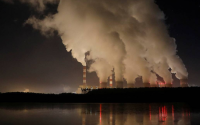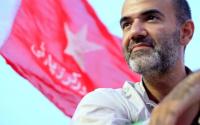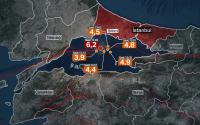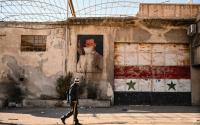Common Dreams / Published on Wednesday, April 14, 2004 by the Guardian/UKPatrick Barrett
The US military has been accused of threatening the media covering the conflict in Iraq and pressuring journalists into presenting a one-sided picture of events.
Al-Jazeera, the Arab TV channel, made the accusations after a US army spokesman, Brigadier General Kimmitt, accused the station and the Dubai-based al-Arabiya news channel, of taking an "anti-coalition" stance in their reporting.
The already fractious relationship between the US military in Iraq and Arab media has been made more difficult by pictures of wounded civilians within the besieged town of Falluja. The American administration in Iraq accused al-Jazeera of exaggerating the number of civilian casualties and helping to boost anti-coalition sentiment.
The US marine commander in charge of Falluja has said the majority of the estimated 600 people killed in the four-day conflict were legitimate targets, saying, "95% of those were military age males that were killed in the fighting". However al-Jazeera and al-Arabiya have repeatedly shown pictures of women and children among the dead and injured.
In a statement the TV channel said the US military was putting "unjustified pressure on the media".
"Al-Jazeera rejects these accusations and considers them a threat to the right of the media to cover the reality in Iraq amid a difficult and complex situation on the ground."
Al-Jazeera's accusations follow suggestions that US soldiers fired on a reporting team from the station based in Falluja and had made the removal of al-Jazeera's crew from the town one of its terms for a ceasefire with the rebels.
A spokesman added that the station felt compelled to make it clear to viewers that it was broadcasting an unbiased account of events in Iraq.
"We felt it was a grave accusation and wanted to set the record straight. Al-Jazeera is determined to maintain its professional integrity and reporting in a balanced way," he said.
Al-Jazeera's claims come amid increasing concern that the mounting dangers facing western journalists in Iraq could mean the end of independent reporting from the country.
'We will not operate outside Baghdad'
James Hider, a Times reporter who is embedded with US Marines near the front line outside Falluja, said the threat of kidnapping had become so acute that the majority of western journalists were no longer venturing beyond Baghdad.
"It was very serious even before the current situation, but for the past month it has got much worse. The kidnappings and shooting are coming thick and fast.
"We've more or less decided not to operate outside Baghdad. A lot of pretty seasoned war correspondents have decided it's not worth the risk," Hider told MediaGuardian.co.uk.
Hider, whose colleague Stephen Farrell was kidnapped and eventually released last week, said the only way he and a group of other western media personnel had made it to Falluja was on heavily armed US helicopter gunships.
Francis Harris, the deputy foreign news editor at the Daily Telegraph, said the situation in Iraq could get to the stage where the paper would consider withdrawing its reporters.
"It could come to that. What would trigger an exodus is something bad happening to a British journalist.
"If that happens you'd get to a situation like Beirut in the 1980s, when everybody left except a hardened few."
'If bandits are after cash you are in real trouble'
Hider said the journalists who were most at risk of kidnapping were those with little experience of the country or those who were on short-term visits.
"A lot of people come in on short-term visits and pick up drivers and translators not knowing who they are. There have been a few kidnappings that have had the look of inside jobs. So we work with a trusted pool of drivers and translators."
In spite of the increasingly serious situation in Iraq, Hider said he believed the western press would stay even if journalists were restricted to Baghdad and the Palestine Hotel, which is being used as a base by most foreign journalists in the country.
"The Palestine Hotel is pretty much unassailable. It's unlikely journalists would be driven out, it's just that then the danger is that you couldn't get the story."
He said the real threat to journalists came from bands of Iraqi insurgents unconnected with the main resistance group.
"The level of danger depends on who you get kidnapped by. If it's the hard core resistance, they are fairly disciplined and want journalists to come in and see what the US is doing. If you get taken by some dodgy group that's little more than a group of bandits that have decided to join up with the resistance movement or are after cash, then you are in real trouble."
Movement of British journalists restricted
The Daily Telegraph currently has its staff reporter, David Blair, and freelance stringer, Jack Fairweather, on the ground in Baghdad, but Harris said their movements were being hampered by the growing danger from kidnappers and resistance fighters outside the capital.
"It has greatly limited their ability to travel outside Baghdad.
"They are being considerably more cautious than they were before this trouble began. But inevitably in order to do the job, they need to talk to people. It's never been the policy of this paper or any other British paper to have reporters go around in forests of guns to guarantee their security," he said.
"If it becomes too dangerous you end up with journalists locked up in secure zones interviewing each other and relying on the authorities for information," he said.
Over the past week, as well as Farrell, a French journalist, two Japanese and two Czech journalists have been kidnapped along with a growing number of foreign contract workers.
Hider said most experienced journalists had been using ordinary Iraqi cars and were accompanied by a trusted driver and translator when venturing around Baghdad or to other towns.
But even with extra precautions such as tinted windows and disguises, Hider said traveling on the roads to key areas such as Najaf and Kut was now deemed too dangerous by most journalists.
On his last drive outside of Baghdad - to Najaf - Hider said he and his colleagues had had to run the gauntlet of burning vehicles and shooting on either side of the road.
"The danger has been being mistaken for a contractor. The number one rule is, don't be driven around in a big white 4x4 like the ones used by contractors, because they are basically bullet magnets."






